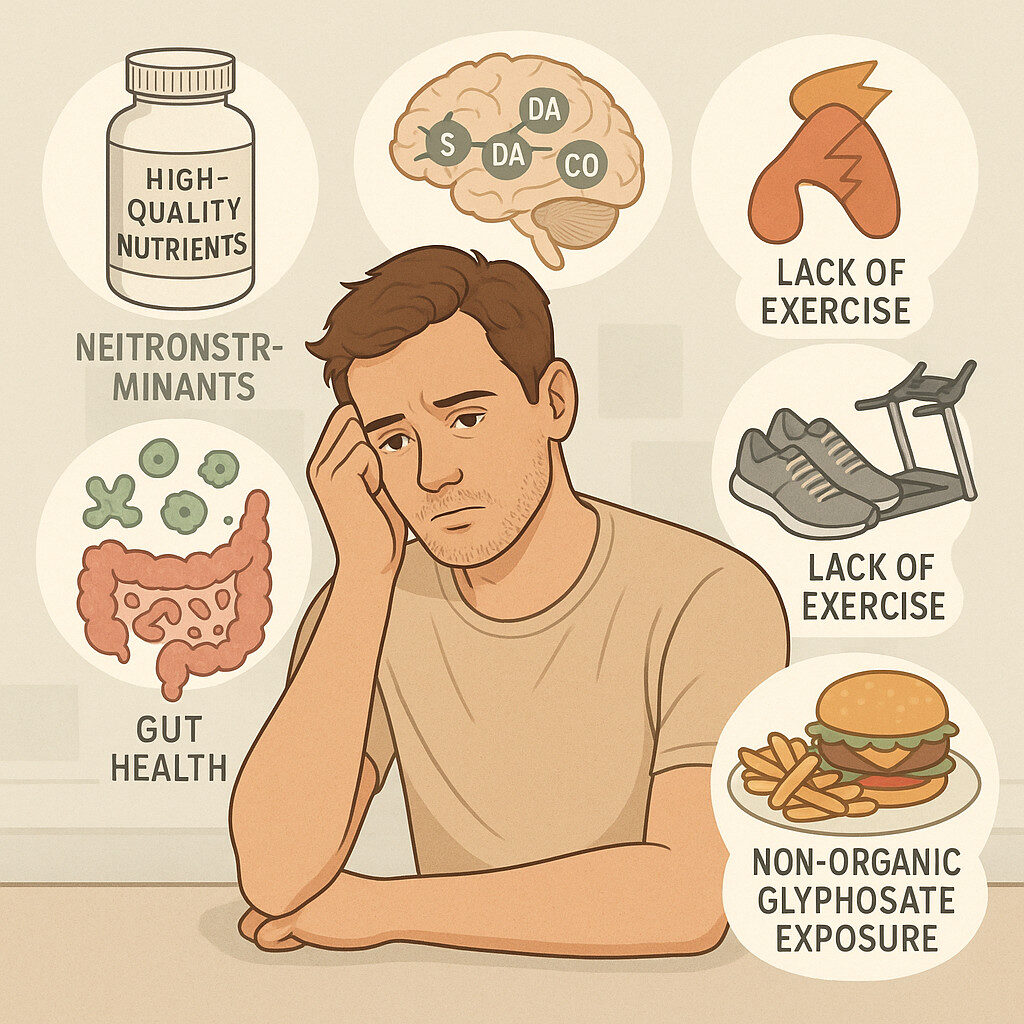Depression is more than a mental health diagnosis—it’s a message from the body that something deeper is out of balance. While conventional medicine often reduces depression to a “chemical imbalance,” naturopathic and functional medicine reveal that it’s far more complex—and far more treatable at the root. When I treat patients who suffer with depression, I am seeing beyond the diagnosis to the person and we look at all the possible underlying causes and find the ones that are at play in each person’s case. Then we address, support the part of the body that is out of balance, and that’s usually all that we have to do. One very important thing I ask everyone is, what would you do if there were no limitations. We work together to release the stuck feeling and open up to more in life. Okay, let’s dive into this together.
Beyond the Brain: What Really Causes Depression?
Depression can be caused—or worsened—by many overlapping physical imbalances. Some of the most common include:
-
Chronic inflammation
-
Neurotransmitter deficiencies (serotonin, dopamine, norepinephrine, epinephrine, and cortisol)
-
Gut microbiome imbalances
-
Nutrient deficiencies (iron, activated B vitamins, magnesium, molybdenum, zinc)
-
Toxin exposure (glyphosate, mold, heavy metals)
-
Poor methylation
-
Hormonal imbalances
-
Anemia (especially iron-deficiency)
Each of these factors can interfere with your brain chemistry, energy, focus, and emotional resilience.
Neurotransmitters & Nutrients
Your brain depends on a steady supply of nutrients to make neurotransmitters. Low levels of:
-
Serotonin can cause sadness and low mood
-
Dopamine can lead to apathy and low motivation
-
Norepinephrine and epinephrine affect alertness and response to stress
-
Cortisol, your stress hormone, when depleted, can contribute to exhaustion and mood instability
If your body is low in key building blocks—like B vitamins, iron, and amino acids—these neurotransmitters may not be produced or used efficiently.
Methylation, the process that activates B vitamins and detoxifies chemicals, plays a central role. If methylation is impaired (due to genetics or environmental factors), your mood may suffer even if you’re technically getting “enough” nutrients.
Gut Health & Mood
Over 90% of serotonin is produced in the gut, not the brain. This means your digestive system is directly tied to your emotional state.
Poor gut health can stem from:
-
Processed foods and artificial additives
-
Pesticides and glyphosate in non-organic foods
-
Chronic stress and lack of diverse plant-based fibers
-
Antibiotics and poor diet reducing healthy gut flora
A damaged gut lining, inflamed microbiome, or hidden infections (like Candida or parasites) can send inflammatory signals to the brain and disrupt serotonin production.
Supporting gut health with organic whole foods, targeted probiotics, digestive nutrients like L-glutamine and zinc carnosine, and avoiding toxic exposures can help restore emotional balance.
Inflammation and Depression
One of the most overlooked contributors to depression is systemic inflammation. Inflammatory cytokines can:
-
Block serotonin receptors
-
Impair brain cell regeneration
-
Disrupt hormonal signaling
-
Cause fatigue and “brain fog”
Sources of chronic inflammation include:
-
Poor gut health or leaky gut
-
Hidden food sensitivities
-
Mold and environmental toxins
-
Heavy metals like mercury or lead
-
Excess omega-6 fats in processed foods
Addressing inflammation with an anti-inflammatory diet, sauna therapy, purified water, glutathione support, and toxin reduction can dramatically improve mood.
Depression Is a State, Not an Identity
It’s important to understand that depression is not who you are—it’s a state your body and mind are experiencing due to underlying imbalances.
This state may be a signal that something needs to change: your diet, sleep, hormone levels, mindset, or toxic exposures. With the right support, your body can return to balance.
Start small:
-
✅ Exercise daily – Studies show it can be as effective as antidepressants
-
✅ Eliminate processed foods – Protect your microbiome and mood chemistry
-
✅ Support sleep and circadian rhythm – Prioritize rest and recovery
-
✅ Eat organic, whole foods – To nourish your brain and reduce toxin load
-
✅ Consider testing – For methylation status, nutrient levels, gut health, and toxins
You’re Not Broken—You’re Healing
I’ve seen time and time again that when we support the body with high-quality nutrients, hormone balance, gut repair, and stress reduction, patients shift—mentally, emotionally, and physically. Once the root causes of depression are found, the healing can begin.
Your symptoms are not a life sentence. They’re feedback. And the body has a powerful capacity to heal when we give it the right tools.
References
-
Clapp M, et al. Gut microbiota’s effect on mental health: The gut-brain axis. Clin Pract. 2017.
-
Lucock M. Folic acid: nutritional biochemistry and disease processes. Mol Genet Metab. 2000.
-
O’Leary F, Samman S. Vitamin B12 in health and disease. Nutrients. 2010.



